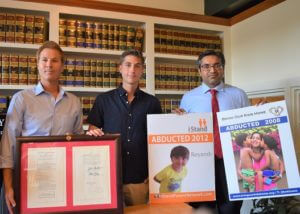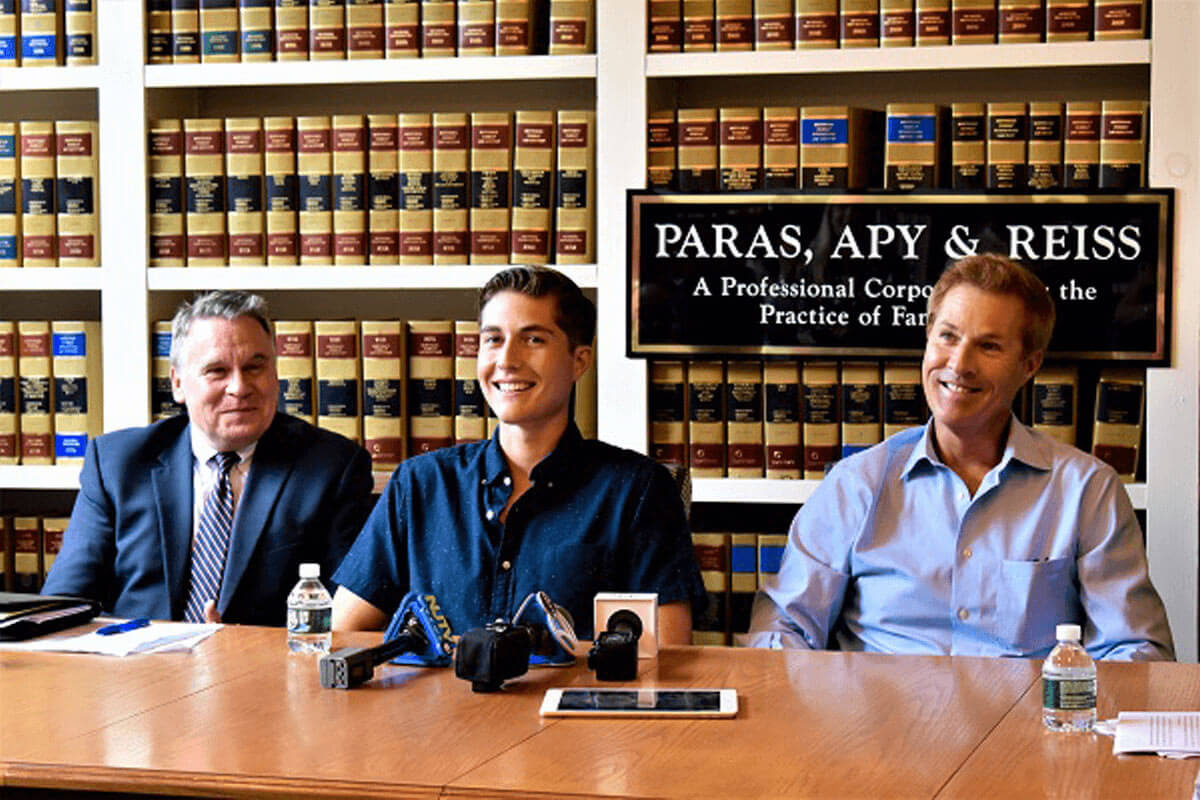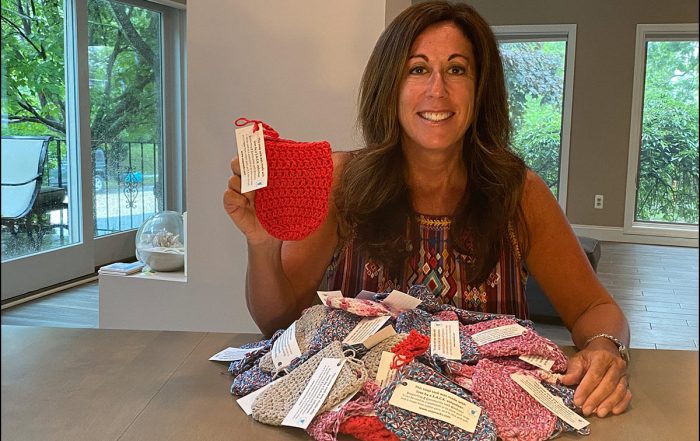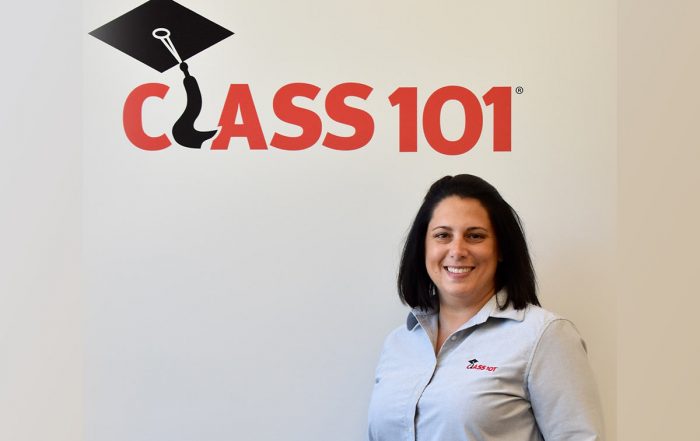PHOTOGRAPHY CREDIT: Cathy Padilla
“Our love affair is over.” Imagine being blindsided by those words, on Father’s Day, from your spouse. And then imagine the spouse is across the world in Brazil, with your four-year-old son, and announces by telephone that she is never returning. David Goldman did not imagine this – he lived it fifteen years ago. And so began the long, agonizing, entangled quest to reunite with his son, Sean.

David Goldman, Sean Goldman and Ravi Parmar of Manalapan – who spoke about the abduction of his son to India in 2012.
This was an important national case with international implications, and it was the impetus behind the passage of federal legislation. The plight of David and Sean humanized an all too common, but mind-boggling concept – Parental Abduction. The case magnified the effect of abduction on the left behind spouse, but what about the perspective of the abducted child and the psychological effects? Sean was only four when he was taken to Brazil, and almost ten when he boarded a plane back to America on Christmas Eve a decade ago. He was leaving behind relatives and friends, and now facing a language barrier, a home he didn’t remember, a new school, and a man he hardly knew as his father. To make matters even more difficult, his mother had remarried while in Brazil and a year before Sean’s repatriation to America, she died while giving birth to a daughter. Sean’s maternal grandparents and his stepfather took over and vigorously continued the fight to deprive David of his son. Last month, Sean (now 19) and David Goldman shared a table at a press conference with two people who were instrumental in the reunion: David’s attorney, Patricia (Tricia) Apy of Paras, Apy & Reiss, and U.S. Congressman Chris Smith. Each worked tirelessly to return Sean to America and later collaborated on what needed to be done to help others, resulting in legislation sponsored by Rep. Smith. The resultant Sean and David Goldman International Parental Kidnapping Prevention and Return Act (“Goldman Act”) was signed into law by President Obama on August 8, 2014. Rep. Smith noted, “There has been a continuing, consistent decrease in the number of abductions from a high of 1,512 in 2008 to 698 abductions in 2018.” All agreed that there is still much work to be done. The recent reunion in Red Bank marked two very special anniversaries: the upcoming tenth anniversary of Sean’s return and the fifth anniversary of the passage of the Goldman Act. The panelists shared their unique perspectives and offered guidance to others facing this horror. The ordeal began innocently enough. David had driven Sean, his then wife, and her family to the airport, happy they would be enjoying a short vacation in Brazil, while he stayed behind to plan for his wife’s upcoming birthday. (Later, this would be used against him, the allegation being “he allowed Sean to leave.”) Only three days after landing in Brazil, the fateful telephone call took place. Before he could even digest this pronouncement that his marriage was finished, David was hit with the cruelest ultimatum of all. “If I ever wanted to see Sean again, I couldn’t go to the law to say there was a kidnapping; or do any type of legal proceedings against her. (I was) to fly to Brazil, meet with her attorney, sign ten pages of legal documents, essentially meeting all demands and giving away 100 percent of Sean’s right to me as his dad and mine as his father. Otherwise, I would never see him again and would spend all my money trying.”

U.S. Congressman Chris Smith, Sean Goldman, David Goldman, and Patricia (Tricia) Apy of Paras, Apy & Reiss
Where to start? Obviously, the Goldman Act did not yet exist and therefore the case was forging new ground. As Rep. Smith noted in his opening remarks, “David Goldman was blessed to have an amazing international family law attorney Patricia Apy – a world class expert in child abduction cases and related matters.” Apy then recounted her initial meetings with David. She recognized immediately that “this was not a custody case gone bad. This was an act of child abuse. Parents should not have to suddenly become their own secretary of state, trying to negotiate a resolution between countries.” However, despite obtaining many favorable court decisions from the Monmouth County Family Court, Sean was still not returned. Desperately trying to maintain a relationship with his son, David traveled to Brazil more than a dozen times only to be refused access to Sean. All the while, the family engaged in “parental alienation,” repeatedly lying to Sean, telling him that his father did not want to see him. When father and son finally did get to visit, David was devastated by Sean’s inquiries about why he never came to see him. It speaks volumes about a parent’s love for his son that David did not retaliate or resort to saying negative things about the Brazilian family. It was painfully apparent the legal system alone was not equipped to resolve these issues. Apy knew she had to attack the case from many angles. David summed up the collaborative efforts. “Ultimately, it happened, with attorney Tricia and an attorney in Brazil, with government help, with media help, walking the halls of Congress, with rallies (the Bring Home Sean group was started by his friend Mark DeAngelis), every way possible to finally get a Brazilian court order to return him.” This was truly a nonpartisan issue and effort with many legislators working behind the scenes. Rep. Smith continued his advocacy and flew to Brazil with David to bring Sean home. The story, not surprisingly, does not end there. In a heartbreaking twist, shortly after David arrived, the Brazilian Supreme Court suspended the decision to return Sean. It ruled Sean must testify and remain in Brazil until the case settled – which would not be soon as a two-month recess was set to begin that very day! They were up against tremendous odds. David said at the time, “To demand a 9-year-old, innocent, psychologically damaged child to speak in court is beyond cruel.” And David had every reason to believe Sean was being expertly manipulated by his ex-wife’s family. His stepfather and step-grandfather were family lawyers in Brazil. David explained, “[They] gave lectures on how the abducting parent will use the child as an attack missile against the left behind parent. So they pretty much wrote the textbook on these things.” Sean reflected, “When a child is brought over to another country, the other parent is going to tell the child a lot of bad things about the parent they are not in contact with. That is going to skew the perception of the other parent and may influence the decision on where to live. No one is telling you exactly what is going on. As I got older, I was able to see how they tried to skew my perception. It’s crazy what people will do to win.” The impending court delay led to diplomatic pressure. Sen. Frank Lautenberg (NJ) placed a hold on a trade bill that would benefit Brazil. This led to the court’s decision to allow Sean to leave the country. After six years of persistence and disappointments, Sean returned home to Holmdel on Christmas Eve, 2009. A decade has passed. It felt like a small miracle to see how far Sean has progressed. He spoke about being a nine-year-old entering a whole new world. “I had a lot of doubts. I was told lies for almost six years. It was hard. You’re told one thing for a lot of your life and then you see that it is just lies and as a kid you feel betrayed. It took a week and a half after coming home to call him ‘Dad’.” Sean laughed, “I [called him Dad] out of panic! It was winter and I was falling into a river. But it felt natural. One step at a time, I felt more and more at home. I realized there was nothing for me to worry about. [Now] I have no complaints. I really like my job, my friends… and my dad.” Sean is enrolled in Brookdale Community College. When asked what he planned to study, he had the entire room laughing. “I am thinking about a political science major, because, well, I’m sure you can guess why.” Sean did keep in touch with his Brazilian family for a time. “[Contact] was court ordered for six years and then I kept going because they are still my family and I wanted to have contact. But they were saying to the media that there was no contact with me. That was the point where I felt it really wasn’t about me, so I removed myself from the situation.” Apy noted that David and Sean continue to help others facing similar circumstances, meeting with left behind parents and newly returned children. “I’m proud of the resilience with which David has continued to fight. He and Sean have opened their family life to be a voice for people who don’t have the ability or emotional resonance to be able to continue without someone alongside.” The light mood in the room quickly turned somber again, with the reminder that too many abductions remain unresolved. Ravi Parmar of Manalapan was invited to speak about the abduction of his son to India in 2012. The cases often are not taken seriously. An FBI agent told Ravi that his son was not abducted because he was with his mother. “This is one of the few times when the victims are held responsible to solve the crime. We have no other support. We have to negotiate with government officials.” Apy summarized the preventative tools that judges now have through the Goldman Act. Information on abductions and treaty compliances are now reported and accessible. Before allowing travel, American judges can evaluate how difficult a return would be if a particular country held the child. There are a series of diplomatic sanctions available against non-compliant countries, and for the first time a child may be placed on a “do not depart” list. There is hope…and the work continues.
Recommended for you
Kids with Cancer Need Help… Here’s What You Can Do
The daily burdens thrust upon families who are battling pediatric cancer are [...]
Monmouth County Historical Association Virtually Celebrates Annual Garden Party
FEATURED PHOTO: MCHA Executive Committee: (l to r front row) Kathy Jones (2nd [...]
Meet Your Neighbor: Stacy Wiener
FEATURED PHOTO: This is where caption text will go for featured photo. As [...]
Monmouth Film Festival Redefines the Festival Experience this August
As film and theater folk like to say, the show MUST go on, [...]
Meet Your Neighbor: Laura Ciccone, Educational Advisor
FEATURED PHOTO CREDIT: Cathy Padilla Laura Ciccone lives in Lincroft with her [...]
Pet Celebs: August 2020
Your pets can be celebrities too. Send in a photo to info@communitymagazinenj.com! [...]









